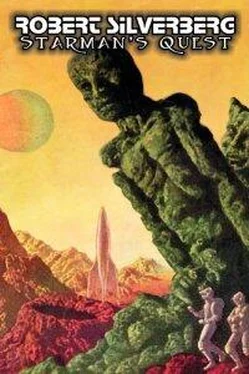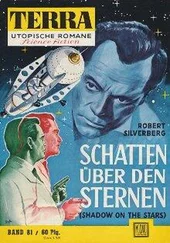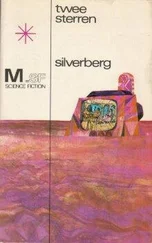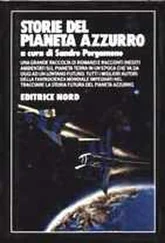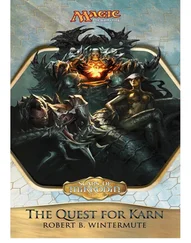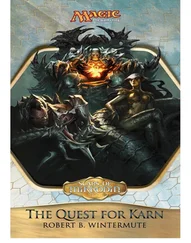Robert Silverberg - Starman's Quest
Здесь есть возможность читать онлайн «Robert Silverberg - Starman's Quest» весь текст электронной книги совершенно бесплатно (целиком полную версию без сокращений). В некоторых случаях можно слушать аудио, скачать через торрент в формате fb2 и присутствует краткое содержание. Год выпуска: 1958, Издательство: Gnome Press, Жанр: Фантастика и фэнтези, на английском языке. Описание произведения, (предисловие) а так же отзывы посетителей доступны на портале библиотеки ЛибКат.
- Название:Starman's Quest
- Автор:
- Издательство:Gnome Press
- Жанр:
- Год:1958
- ISBN:нет данных
- Рейтинг книги:3 / 5. Голосов: 1
-
Избранное:Добавить в избранное
- Отзывы:
-
Ваша оценка:
- 60
- 1
- 2
- 3
- 4
- 5
Starman's Quest: краткое содержание, описание и аннотация
Предлагаем к чтению аннотацию, описание, краткое содержание или предисловие (зависит от того, что написал сам автор книги «Starman's Quest»). Если вы не нашли необходимую информацию о книге — напишите в комментариях, мы постараемся отыскать её.
Starman's Quest — читать онлайн бесплатно полную книгу (весь текст) целиком
Ниже представлен текст книги, разбитый по страницам. Система сохранения места последней прочитанной страницы, позволяет с удобством читать онлайн бесплатно книгу «Starman's Quest», без необходимости каждый раз заново искать на чём Вы остановились. Поставьте закладку, и сможете в любой момент перейти на страницу, на которой закончили чтение.
Интервал:
Закладка:
He spoke briefly with MacIntosh about the process of collecting on Hawkes’ estate, and learned it was a complex process, but nothing to be frightened of. The will was being sent through channels now.
He met Hollis in the street several days later. The bloated loansman looked pale and harried; he had lost weight, and his skin hung flabbily over his bones now. Little as Alan liked the loansman, he insisted on taking him to a local restaurant for lunch.
“How come you’re still hanging around York City?” Alan asked. “I thought the heat was on for any of Max’s old buddies.”
“It is,” Hollis said, wiping sweat from his white shiny forehead. “But so far I’m in the clear. There won’t be much of an investigation; they killed two and caught two, and that’ll keep them happy. After all, the robbery was a failure.”
“Any notion why it failed?”
Hollis nodded. “Sure I have a notion! It was Kovak who tipped them off.”
“Mike?—but he looked okay to me.”
“And to everybody. But he owed Bryson a lot, and Bryson was anxious to dispose of Max. So Kovak turned the plans of the robbery over to Bryson’s boys in exchange for a quitclaim on the money he owed, and Bryson just forwarded it all on to the police. They were waiting for us when we showed up.”
That cleared Gainer, Alan thought in some relief. “How did you find all this out?”
“Bryson himself told me.”
“What!”
“I guess he didn’t know exactly who besides Max was in on the deal. Anyway, he certainly didn’t know I was part of the group,” Hollis said. “Old man Bryson was laying off some bets with me and he let something slip about how he tipped the police to Max. Then he told me the whole thing.”
“And Kovak?”
“Dead,” Hollis said bluntly. “Bryson must have figured that if he’d sell Max out he’d sell anybody out, so Kovak got taken care of. He was found yesterday. Heart failure, the report said. Bryson has some good drugs. Say, kid—any word yet on what’s going to happen to all Max’s dough?”
Alan thought a moment before replying. “I haven’t heard a thing. I guess the government inherits it.”
“That would be too bad,” Hollis said speculatively. “Max was well loaded. I’d like to get my hands into some of that dough myself. So would Bryson and his bunch, I’ll bet.”
Alan said nothing. When he was through eating, he paid the check and they left, Hollis heading north, Alan south. In three days, Hawkes’ will would go through the courts. Alan wondered if Bryson, who seemed to be York City’s major criminal syndic man, would try to angle some share of Max’s money.
A Bryson man did show up at the hearing—a slick-looking operator named Berwin. His claim was that Hawkes had been affiliated with Bryson a number of years ago, and that Hawkes’ money should revert to Bryson by virtue of an obscure law of the last century involving the estates of professional gamblers killed in criminal actions.
The robocomputer who was in charge of the hearing pondered the request a few moments; then relays clicked and the left-hand panel on the computer face lit up with a bright red APPLICATION DENIED signal.
Berwin spoke for three minutes, ending up with a request that the robocomputer disqualify itself from the hearing and allow itself to be replaced by a human judge.
The computer’s decision was even quicker this time. APPLICATION DENIED.
Berwin tossed Alan’s side of the courtroom a black look and yielded ground. Alan had engaged a lawyer recommended once by Hawkes, a man named Jesperson. Briefly and concisely Jesperson cited Alan’s claim to the money, read the terms of the will, and stepped back.
The computer considered Jesperson’s plea a few moments, reviewing the brief which the lawyer had taped and fed to the computer earlier. Time passed. Then the green panel lit, and the words, APPLICATION GRANTED.
Alan smiled. Bryson had been defeated; Max’s money was his. Money that could be turned toward intensified research on the hyperdrive.
“Well, son?” Jesperson asked. “How does it feel to be a millionaire?”
Chapter Sixteen
At the time, he had been much too excited and flustered to answer anything. But, as the next twelve months went by, he learned that being a millionaire was quite pleasant indeed.
There were headaches, of course. There was the initial headache of signing his name several hundred times in the course of the transfer of Hawkes’ wealth to him. There were also the frequent visits from the tax-collectors, and the payment to them of a sum that staggered Alan to think about, in the name of Rotation Tax.
But even after taxes, legal fees, and other expenses, Alan found he owned better than nine hundred thousand credits, and the estate grew by investment every day. The court appointed a legal guardian for him, the lawyer Jesperson, who was to administer Alan’s money until Alan reached the biological age of twenty-one. The decision was an involved one, since Alan had undeniably been born three hundred years earlier, in 3576—but the robojudge that presided over that particular hearing cited a precedent seven hundred years old which stated that for legal purposes a starman’s biological and not his chronological age was to be accepted.
The guardianship posed no problems for Alan, though. When he met with Jesperson to discuss future plans, the lawyer told him, “You can handle yourself, Alan. I’ll give you free rein with the estate—with the proviso that I have veto power over any of your expenditures until your twenty-first birthday.”
That sounded fair enough. Alan had reason to trust the lawyer; hadn’t Hawkes recommended him? “I’ll agree to that,” Alan said. “Suppose we start right now. I’d like to take a year and travel around the world. As my legal guardian you’ll be stuck with the job of managing my estate and handling investments for me.”
Jesperson chuckled. “You’ll be twice as wealthy when you get back! Nothing makes money so fast as money.”
Alan left the first week in December, having spent three weeks doing virtually nothing but sketching out his itinerary. There were plenty of places he intended to visit.
There was London, where James Hudson Cavour had lived and where his hyperdrive research had been carried out. There was the Lexman Institute of Space Travel in Zurich, where an extensive library of space literature had been accumulated; it was possible that hidden away in their files was some stray notebook of Cavour’s, some clue that would give Alan a lead. He wanted to visit the area in Siberia that Cavour had used as his testing-ground, and from which the last bulletin had come from the scientist before his unexplained disappearance.
But it was not only a business trip. Alan had lived nearly half a year in the squalor of Hasbrouck—and because of his Free Status he would never be able to move into a better district, despite his wealth. But he wanted to see the rest of Earth. He wanted to travel just for the sake of travel.
Before he left, he visited a rare book dealer in York City, and for an exorbitant fifty credits purchased a fifth-edition copy of An Investigation into the Possibility of Faster-than-Light Space Travel , by James H. Cavour. He had left his copy of the work aboard the Valhalla , along with the few personal possessions he had managed to accumulate during his life as a starman.
The book dealer had frowned when Alan asked for the volume under the title he knew. “ The Cavour Theory ? I don’t think—ah, wait.” He vanished for perhaps five minutes and returned with an old, fragile, almost impossibly delicate-looking book. Alan took it and scanned the opening page. There were the words he had read so many times: “The present system of interstellar travel is so grossly inefficient as to be virtually inoperable on an absolute level.”
Читать дальшеИнтервал:
Закладка:
Похожие книги на «Starman's Quest»
Представляем Вашему вниманию похожие книги на «Starman's Quest» списком для выбора. Мы отобрали схожую по названию и смыслу литературу в надежде предоставить читателям больше вариантов отыскать новые, интересные, ещё непрочитанные произведения.
Обсуждение, отзывы о книге «Starman's Quest» и просто собственные мнения читателей. Оставьте ваши комментарии, напишите, что Вы думаете о произведении, его смысле или главных героях. Укажите что конкретно понравилось, а что нет, и почему Вы так считаете.
